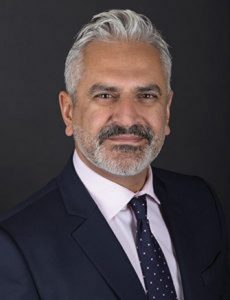The knee is the largest hinge joint within the body and over 70,000 knee replacements are carried out in England and Wales each year. Mr Chan Jeer, Consultant Orthopaedic Knee Surgeon at One Ashford Hospital explains treatment options available, before requiring knee replacement surgery and what the future holds for those who undergo the procedure.
As a dedicated knee surgeon, I can say with some confidence that knee replacement is actually a very good operation. 95% of knee replacements are expected to survive after five years, with 80% surviving after twenty years. Patient satisfaction is good at 80 to 85%, and there is no difference between standard off-the-shelf prostheses as opposed to modern-day prostheses, or indeed those implanted by million dollar robots. However, it is accepted that satisfaction rates are greater with modern-day prostheses, and survivorship should be checked against the implant, and ideally you should ask your surgeon whether the implant is ten ‘A’ star rated, to ensure that it has excellent survivorship in excess of ten years.
The greatest challenge being faced by knee surgeons at present however is that we are seeing younger and younger patients presenting with premature arthritic disease, or even end stage arthritis, and age is definitely an issue when it comes to having joint replacement. The younger a patient is when they have knee replacement and the more active they are, the higher their functional demands and expectations are likely to be. This means an increased rate of wear on the prosthesis, and potentially an earlier failure rate. Combine this with the fact that younger patients tend to live longer and this presents a real dilemma to knee surgeons as the risk of revision surgery is expected to be higher in younger patients who undergo knee replacement. One would expect a knee replacement in a patient in their seventies will only require revision with a 10% likelihood; an individual in their fifties having a knee replacement is likely to face a 50% life time risk of revision. This does of course have implications as a revision knee replacement is twice as technically complex as the primary surgery with double the complication rates and poorer outcomes. Ideally, therefore, surgeons do try and avoid joint replacement in younger patients, however what do we do with the ever increasing cohort of younger patients presenting with premature knee arthritis?? In my opinion, the keys are biological preservation of the knee, for as long as possible. This includes exhausting conservative management, using pain killers, anti-inflammatories, physiotherapy, walking aids, intra-articular injections including local anaesthetic and steroid, and visco-supplements and arthroscopy with meniscal tears and loose bodies and locking type symptoms. Arthroscopy however should be avoided in knees that are purely arthritic. When possible, meniscal tears in young patients should have repair when feasible, ligaments should be reconstructed to ensure stability. When limbs are mal-aligned with significant bow leggedness or knock knee presentation, there is an option to re-align the knees with an operation known as an osteotomy. Osteotomy however does require an operation to straighten the knee, another operation to remove the metal work, and then a knee replacement is still required in the future, and there is evidence to suggest that people who have undergone multiple procedures ultimately do worse following knee replacement compared to individuals with a virgin knee undergoing a knee replacement. There are trends to transplant meniscal cartilage, graft articular cartilage; combine these with ligament reconstructions and osteotomy procedures, these are reasonable options to try and preserve natural knees in younger patients, but there is a price to pay with respect to multiple surgical procedures. They do require specialist approaches and skills, and are not simple surgical procedures done by general orthopaedic surgeons.
There is a current trend to preserve and try and engineer cartilage, including the use of 3D printed custom-made biological scaffolds with living cells soaked in growth factors. The technology here however is still emerging. There are a number of stem cell injections into joints that are being offered by surgeons. Again it is always important to look at the evidence behind these various procedures and understand that such procedures cannot correct meniscal tears or ligamentous instability or mal-alignment of the knee which are important factors to consider in assessing and managing knees.
The future is exciting with knee surgery. There will be a trend in my opinion in the evolution of cartilage regenerative surgery. In the meantime our enthusiasm should be tempered by science and safety, and ideally we may in the future be able to preserve and regenerate knees to the point that joint replacement may become an obsolete procedure. The future is exciting, but at the moment progress is extremely slow with respect to regenerative surgery, and there clearly will be many years of hard scientific and clinical work to develop these procedures further.
Consultant Orthopaedic Knee Surgeon, Mr Chan Jeer
Mr Chan Jeer is a Consultant Orthopaedic Surgeon at One Ashford Hospital, specialising in knee surgery.
He qualified in 1993 and his clinical interests include:
- Knee Replacement
- Knee Arthroscopy
- Sports knee surgery of the meniscus
- Anterior Cruciate Ligament and Cartilage defects
- Knee preservation strategies including visco-supplements and Mesenchymal Stem cell injections
For further information on Mr Jeer, click here
Why choose One Ashford Hospital?
-
- Competitive fixed-price packages
-
See a Consultant within 48 hours**
-
Prompt access to treatment procedures
-
Specialist Physiotherapy and nursing teams
-
Fast access to diagnostics, including MRI, X-Ray and Ultrasound
-
Dedicated Endoscopy suite
-
Private, spacious ensuite rooms
*Terms and conditions apply
**Dependent on Consultant availability





 One Ashford
One Ashford One Hatfield
One Hatfield